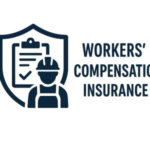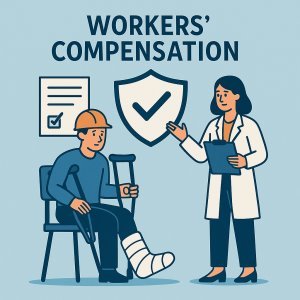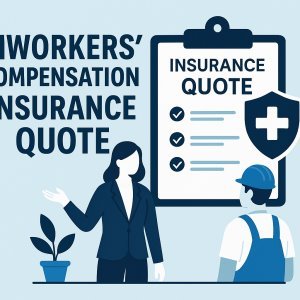
Workers Comp Safety Credits: Do You Qualify Today?
July 26, 2025
Designing a Workers’ Comp Policy—Staffing Services
July 26, 2025In today’s complex regulatory environment, employers engaging with Global Employer of Record (EOR) services face unique challenges in ensuring compliance with workers’ compensation (workers’ comp) requirements. Particularly in Georgia, where specific state laws adn regulations govern employee protections, understanding the nuances of workers’ comp coverage is critical to mitigating risk and safeguarding both the business and its workforce. This guide provides a thorough overview tailored for employers partnering with GA-based EORs, outlining essential compliance obligations, best practices, and practical strategies to navigate the workers’ comp landscape effectively and maintain operational integrity.
table of Contents
- Understanding Georgia’s EOR Workers’ Compensation Requirements
- Key Compliance Challenges for Employers Using EOR Services
- Implementing Effective Risk Management strategies in EOR Arrangements
- best Practices for Maintaining regulatory Compliance and Documentation
- Q&A
- Concluding Remarks
Understanding Georgia’s EOR Workers’ Compensation Requirements
employers operating as an Employer of Record (EOR) in Georgia must navigate a complex landscape of workers’ compensation regulations designed to protect both the workforce and the business. The state’s requirements mandate that EORs secure valid workers’ compensation insurance covering all employees, irrespective of whether they are temporary, part-time, or full-time. This insurance is crucial as it provides benefits to employees who sustain work-related injuries or illnesses, shielding employers from potential lawsuits and financial liabilities. Compliance involves understanding the nuances of Georgia’s statutes, including specific coverage thresholds, reporting obligations, and distinctions pertaining to construction versus non-construction industries.
Key considerations for EOR workers’ comp compliance include:
- Insurance Coverage Limits: Minimum statutory coverage levels must be met and maintained without gaps.
- Employee Classification: Correctly categorizing employees ensures accurate premium calculations and compliance.
- Claims Management: Prompt reporting and proper handling of workplace injuries reduce risk exposure.
- State Reporting Requirements: Adherence to timely submission of accident reports and insurance documentation.
| Requirement | Georgia Standard | EOR Consideration |
|---|---|---|
| Coverage threshold | Mandatory for all employers with 3+ employees | EORs must confirm coverage applies across all contracted workers |
| Premium Payments | Based on accurate class codes and payroll data | EOR responsible for remitting premiums on behalf of clients |
| Reporting Injuries | Written report within 5 days of injury | EOR ensures timely communication with insurers and clients |
key Compliance Challenges for Employers Using EOR Services
Employers partnering with Employee of Record (EOR) services face distinctive hurdles ensuring their workers’ compensation policies meet Georgia’s stringent regulatory landscape. One of the primary challenges lies in the proper classification of employees, as misclassification can lead to significant fines and coverage gaps. EOR providers often manage multiple client accounts, making it essential for employers to verify that each worker is accurately categorized according to job responsibilities and risk levels. Additionally, understanding who holds liability-whether the EOR or the client company-requires clear contractual agreements and constant vigilance to maintain compliance and avoid inadvertent legal exposure.
Another critical concern involves maintaining seamless reporting and documentation. Employers must ensure that the EOR is consistently up-to-date with all claims, risk assessments, and premium payments associated with their workforce. In georgia,delays or inaccuracies in claims reporting can result in delayed benefits and increased costs. Below is a summary of key compliance checkpoints employers should monitor when using EOR solutions:
| Compliance Element | Employer Obligation | Potential Risk if Neglected |
|---|---|---|
| Employee Classification | Verify proper classification per job duties | Fines, under/overpayment of premiums |
| Liability Clarity | Confirm contractual liability terms with EOR | Legal disputes, unexpected claims |
| Claims Reporting | Ensure timely and accurate claims documentation | Delayed benefits, higher premiums |
| Policy Renewal | Monitor renewal dates and policy updates | Coverage gaps, non-compliance penalties |
Implementing effective Risk Management Strategies in EOR Arrangements
To safeguard your organization within EOR arrangements, it is crucial to devise proactive risk management protocols tailored to both legal and operational aspects. Start by conducting comprehensive assessments of potential liabilities related to workers’ compensation claims.Incorporate routine audits to verify the accuracy of payroll classifications and ensure compliance with Georgia-specific regulatory requirements. Leveraging technology, such as centralized incident reporting systems, can facilitate real-time monitoring of workplace injuries, enabling swift corrective action and improved clarity between employers and the EOR provider.
- Establish clear communication channels between your HR team and the EOR service to streamline claims processing and problem resolution.
- Develop a formalized safety training program aligned with Georgia OSHA standards to reduce workplace incidents.
- Regularly review contractual obligations in the EOR agreement to clarify risk transfer and coverage responsibilities.
| Risk Factor | Mitigation Strategy | Benefit |
|---|---|---|
| Misclassification of Workers | Periodic payroll audits | Accurate WC premiums |
| Claims Processing Delays | Dedicated liaison role | Faster claim resolution |
| Safety Standard Gaps | Customized training sessions | Reduced injury rates |
Best Practices for Maintaining Regulatory Compliance and Documentation
Effectively managing workers’ compensation compliance requires meticulous attention to detail and a structured approach to documentation. Employers should implement a centralized system for record-keeping that includes policy documents, employee injury records, and communication logs with insurance providers. Regular audits of these records not only ensure that all necessary documentation is current but also help identify any compliance gaps before they become issues. Automating the tracking process with dedicated compliance software can substantially reduce human error and enhance accountability across your HR and risk management teams.
Adhering to Georgia’s specific workers’ compensation requirements also means staying informed about any legislative updates and ensuring all stakeholders are trained accordingly. Consider establishing routine training sessions and compliance briefings for managers and supervisors to reinforce knowledge and best practices. Below is a simple checklist that employers can use to maintain ongoing compliance:
- Maintain up-to-date insurance certificates and policy renewals
- Document all workplace injuries promptly with thorough incident reports
- Ensure employee notification procedures comply with Georgia state law
- Schedule quarterly internal audits of claims and documentation
- Engage with legal counsel to review compliance strategies annually
| Task | Frequency | Responsible party |
|---|---|---|
| Policy Review and Update | Annually | HR Manager |
| Employee Training Sessions | quarterly | Compliance Officer |
| Incident Report Audits | Monthly | Risk Management Team |
Q&A
Q&A: Employers’ Guide-GA EOR Workers’ Comp Compliance
Q1: What is GA EOR in the context of Workers’ Compensation?
A1: GA EOR stands for Georgia Employer of Record, a service through which a third-party organization assumes employer responsibilities, including payroll, tax, and workers’ compensation coverage, on behalf of a client company. This arrangement helps businesses remain compliant with Georgia’s workers’ compensation laws while managing risk and administrative burdens.
Q2: Why is Workers’ Compensation compliance important for employers using an EOR in Georgia?
A2: Compliance with workers’ compensation requirements ensures that injured employees receive appropriate medical care and wage replacement benefits,while protecting employers from legal penalties,fines,and potential litigation. For companies utilizing an EOR, it is indeed crucial to verify that the EOR maintains proper coverage in line with Georgia state mandates to avoid exposure to liabilities.
Q3: What are the key workers’ comp requirements in Georgia employers must consider?
A3: In Georgia, most employers with three or more employees must carry workers’ compensation insurance.The coverage must meet minimum limits outlined in state statutes and cover all eligible employees. Employers are responsible for timely reporting of workplace injuries and claims management. Failure to comply can result in significant financial and legal consequences.
Q4: How dose the role of an EOR impact workers’ comp compliance for a Georgia employer?
A4: The EOR becomes the official employer in the eyes of the law, assuming responsibility for workers’ comp coverage and claims management. It is indeed essential that the client company ensures the EOR provides valid and adequate insurance coverage, files necessary reports, and maintains compliance with Georgia Department of Labor requirements.
Q5: What steps should employers take to ensure compliance when partnering with a GA EOR?
A5: Employers should conduct thorough due diligence by:
- Verifying the EOR’s workers’ comp insurance certificates and coverage limits
- Reviewing the contract to clarify responsibilities related to claims management and reporting
- Ensuring the EOR is registered and compliant with Georgia’s Department of Labor
- Communicating injury reporting procedures clearly to all employees
- Monitoring ongoing compliance through regular audits or reviews
Q6: What are potential risks for employers if their GA EOR fails to maintain workers’ comp compliance?
A6: If an EOR lapses in coverage or fails to comply, the client employer may face secondary liability for workers’ compensation claims, fines, and exposure to lawsuits. Injured employees might also lose benefits or face delays in compensation, leading to reputational damage and increased operational risk.
Q7: Can an employer use an EOR for all types of employees regarding workers’ comp coverage?
A7: Generally, yes, but employers must confirm that the EOR’s workers’ comp insurance covers the specific types of workers engaged-whether full-time, part-time, or temporary. Some high-risk industries or job classifications may require specialized coverage; the employer should verify that the EOR’s policy accommodates such needs.
Q8: Where can employers find official resources to navigate GA workers’ compensation laws when working with an EOR?
A8: Employers can consult the Georgia State Board of Workers’ Compensation website, the Georgia Department of Labor, and professional legal or insurance advisors familiar with Georgia labor laws. These sources provide guidance on statutory requirements, compliance updates, and best practices for working with EORs.
This Q&A provides a concise overview for business leaders seeking to understand and ensure compliance with Georgia workers’ compensation law when utilizing Employer of Record services.
Concluding remarks
navigating workers’ compensation compliance as a Georgia employer working with an Employer of Record (EOR) requires a clear understanding of state-specific regulations and the EOR’s role in managing risk. By partnering with a informed EOR and implementing diligent compliance practices, employers can ensure legal adherence while protecting their workforce and business interests. Staying informed and proactive is essential in maintaining a compliant,efficient,and resilient operation in Georgia’s dynamic labor environment.
“This content was generated with the assistance of artificial intelligence. While we strive for accuracy, AI-generated content may not always reflect the most current information or professional advice. Users are encouraged to independently verify critical information and, where appropriate, consult with qualified professionals, lawyers, state statutes and regulations & NCCI rules & manuals before making decisions based on this content.








